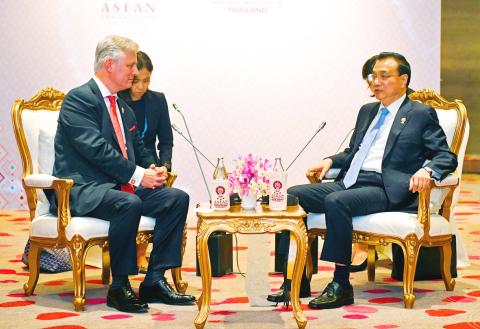The US on Monday accused China of intimidation in the South China Sea as it put forward its strongest language yet rejecting Beijing’s claims to the strategic, dispute-rife waters.
The Pacific powers traded tit-for-tat barbs over the South China Sea at a regional summit in Bangkok, with Beijing accusing Washington of ratcheting up tensions in the waters, a key global shipping route.
Beijing claims huge swathes of the sea, where it is accused of building military installations and fake islands — and ramming fishing vessels.

Photo: Reuters
US National Security Adviser Robert O’Brien highlighted the right of freedom of navigation as he led Washington’s delegation to the ASEAN summit and parallel East Asia Summit.
“Beijing has used intimidation to try and stop ASEAN nations from exploiting their offshore resources,” he said, addressing an ASEAN meeting on Monday.
“Big countries should not bully other countries,” he later told reporters.
As the summit was wrapping up, the US Department of State released a report on its Asia-Pacific strategy with unusually strong language denouncing China’s basis for its claims — the so-called “nine-dash line.”
Beijing’s “maritime claims in the South China Sea, exemplified by the preposterous ‘nine-dash line,’ are unfounded, unlawful and unreasonable,” the report said.
US leaders have been taking an increasingly sharp tone on China, but have generally focused on encouraging all claimants to resolve disputes peacefully, rather than Washington taking a position itself.
Beijing claims the majority of the South China Sea through the “nine-dash line,” a vague delineation based on maps from the 1940s.
Taiwan, Vietnam, the Philippines, Malaysia and Brunei all have rival claims to all or parts of the South China Sea.
Asked about the US’ comments at the ASEAN summit, Chinese Vice Minister of Foreign Affairs Le Yucheng (樂玉成) accused some outside countries of “meddling” in the sea.
“Some non-regional countries cannot live with calm waters in the South China Sea and have come all this way to make waves,” Le said, in an apparent jab at the US.
In return, O’Brien later said that “we don’t think we’re meddlers.”
“We always come when we’re invited, unlike other countries,” he said after Le’s comments emerged.
Despite the strong language from the US in the report, some observers questioned its level of commitment.
O’Brien was the lowest-ranking official ever sent by the US to an East Asia Summit since Washington successfully won an annual invitation in 2011.
The summits are usually attended by heads of state, but a US official said that US President Donald Trump — who on Saturday watched a mixed martial arts championship in his home city of New York — was busy with campaign events.
However, the report said that the US was stepping up its engagement with key partners in Asia, including India and allies Japan and South Korea.
“We are committed to upholding a free and open Indo-Pacific in which all nations, large and small, are secure in their sovereignty and able to pursue economic growth consistent with international law and principles of fair competition,” the report said.

Conflict with Taiwan could leave China with “massive economic disruption, catastrophic military losses, significant social unrest, and devastating sanctions,” a US think tank said in a report released on Monday. The German Marshall Fund released a report titled If China Attacks Taiwan: The Consequences for China of “Minor Conflict” and “Major War” Scenarios. The report details the “massive” economic, military, social and international costs to China in the event of a minor conflict or major war with Taiwan, estimating that the Chinese People’s Liberation Army (PLA) could sustain losses of more than half of its active-duty ground forces, including 100,000 troops. Understanding Chinese

The Ministry of Foreign Affairs (MOFA) yesterday said it is closely monitoring developments in Venezuela, and would continue to cooperate with democratic allies and work together for regional and global security, stability, and prosperity. The remarks came after the US on Saturday launched a series of airstrikes in Venezuela and kidnapped Venezuelan President Nicolas Maduro, who was later flown to New York along with his wife. The pair face US charges related to drug trafficking and alleged cooperation with gangs designated as terrorist organizations. Maduro has denied the allegations. The ministry said that it is closely monitoring the political and economic situation

UNRELENTING: China attempted cyberattacks on Taiwan’s critical infrastructure 2.63 million times per day last year, up from 1.23 million in 2023, the NSB said China’s cyberarmy has long engaged in cyberattacks against Taiwan’s critical infrastructure, employing diverse and evolving tactics, the National Security Bureau (NSB) said yesterday, adding that cyberattacks on critical energy infrastructure last year increased 10-fold compared with the previous year. The NSB yesterday released a report titled Analysis on China’s Cyber Threats to Taiwan’s Critical Infrastructure in 2025, outlining the number of cyberattacks, major tactics and hacker groups. Taiwan’s national intelligence community identified a large number of cybersecurity incidents last year, the bureau said in a statement. China’s cyberarmy last year launched an average of 2.63 million intrusion attempts per day targeting Taiwan’s critical

AGING: As of last month, people aged 65 or older accounted for 20.06 percent of the total population and the number of couples who got married fell by 18,685 from 2024 Taiwan has surpassed South Korea as the country least willing to have children, with an annual crude birthrate of 4.62 per 1,000 people, Ministry of the Interior data showed yesterday. The nation was previously ranked the second-lowest country in terms of total fertility rate, or the average number of children a woman has in her lifetime. However, South Korea’s fertility rate began to recover from 2023, with total fertility rate rising from 0.72 and estimated to reach 0.82 to 0.85 by last year, and the crude birthrate projected at 6.7 per 1,000 people. Japan’s crude birthrate was projected to fall below six,